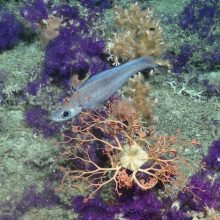The United Nations General Assembly adopted a resolution yesterday calling on countries to redouble their efforts to protect deep-ocean species and ecosystems from the destructive impacts of deep-sea fishing.
The resolution was adopted following a ten-year review of the implementation of landmark UN resolutions committing high seas fishing nations to stop damaging vulnerable areas of the deep ocean and to regulate all deep-sea fishing consistent with sustainability obligations under international law. The UN concluded that fishing nations have still not done enough.
The UN reiterated calls for prohibiting bottom fisheries, such as deep-sea trawling, in areas where vulnerable deep-sea habitats such as cold-water coral reefs, coral gardens, hydrothermal vents and deep-sea sponge grounds are known or likely to occur. The new resolution emphasises the importance of conducting comprehensive prior Environmental Impact Assessments and – for the first time – calls on countries to factor the impact of climate change and ocean acidification into protecting deep sea habitats. It further call on countries to be particularly precautionary in regard to the catch or bycatch of vulnerable, threatened and endangered species such as deep-sea sharks.
Political Advisor to the Deep Sea Conservation Coalition, Matthew Gianni said: “The original deep-sea resolution by the UN General Assembly in 2006 was a major breakthrough moment in ocean conservation and marked an important turning point in the free-for-all attitude to the exploitation of the deep ocean. High seas fishing nations must fulfil their commitments and obligations to protect the global deep-ocean commons for the benefit of all of us.”
Dr. Lance Morgan, President of the DSCC Board and CEO of member organisation Marine Conservation Institute said, “The UN General Assembly resolutions are an expression of the collective concern of the international community in the conservation of the deep ocean, one of the most biologically diverse areas of the planet. The actions called for by the General Assembly must be respected not only to protect the environment but also to serve as precedents for the effective governance of the high seas.”

